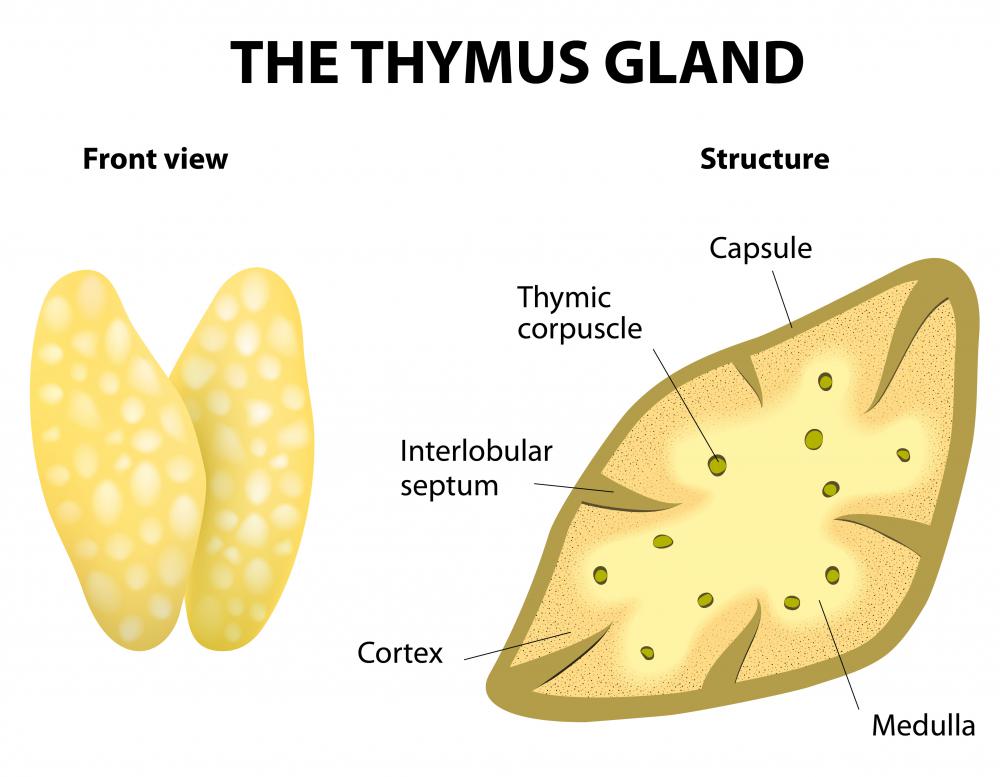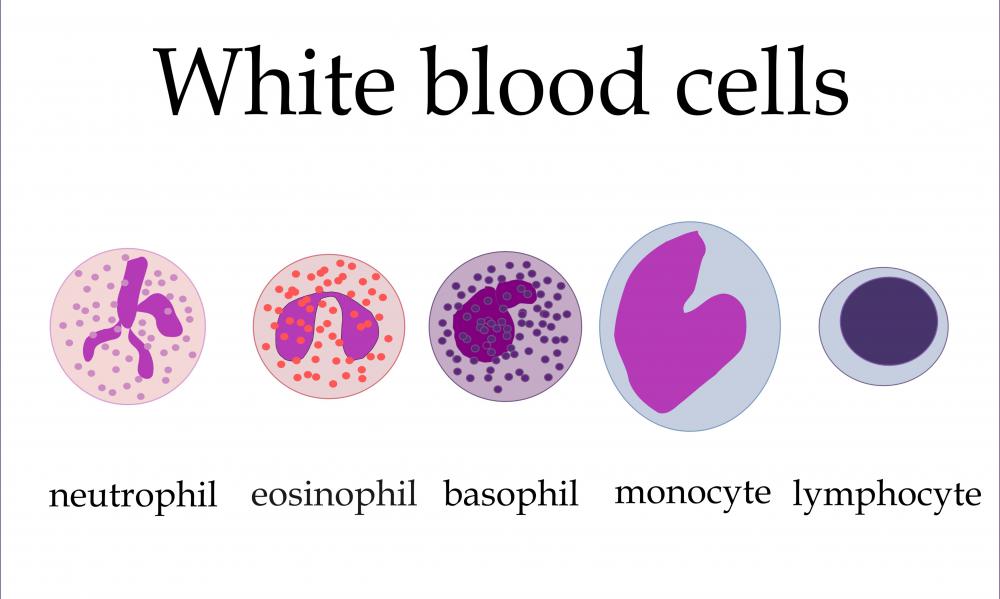At TheHealthBoard, we're committed to delivering accurate, trustworthy information. Our expert-authored content is rigorously fact-checked and sourced from credible authorities. Discover how we uphold the highest standards in providing you with reliable knowledge.
What is an Enlarged Thymus?
The thymus gland is situated just below the neck, behind the breastbone and in front of the heart. It is a flattish structure divided into two lobes, and it plays a part in the normal functioning of the immune system. An enlarged thymus gland can occur for a number of reasons, including simple overgrowth of thymus tissue, which is found in some autoimmune disorders where the body's immune system attacks itself. Other causes of enlargement are: cysts, benign tumors and cancers.
Normally, the thymus gland grows until puberty, when it begins to reduce in size, with the tissue being replaced gradually by fat as one gets older. It is relatively large in babies, so any conditions causing thymus enlargement at this age risk interfering with breathing. The thymus is the place where specialized white blood cells known as T-lymphocytes are able to mature. Mature T-lymphocytes only leave the thymus when they are able to recognize cells and substances in the body that are not part of the self and attack them as part of the immune response. This is why thymus problems can be associated with autoimmune disease, as defective cells may enter the circulation and mistakenly attack the self.

When an enlarged thymus gland is due to overgrowth of thymus tissue, it is usually a sign of autoimmune disease, although there is also a condition in children where the thymus enlarges hugely with no apparent cause, known as idiopathic hyperplasia. The autoimmune condition known as myasthenia gravis is generally associated with an enlarged thymus in adults. People with myasthenia gravis experience muscle weakness as a result of antibodies made by the body which interfere with the way nerves function. This disease can be serious if the muscles of breathing are severely affected, requiring artificial ventilation, but it is generally treatable with medication. The thymus can also be removed surgically, which relieves symptoms in most people, although the specific part the thymus plays in the disease is not fully understood.

A benign, or non-cancerous, growth or tumor may be the cause of an enlarged thymus. Examples of benign growths include cysts, fatty lumps called thymolipomas and tumors known as thymomas. Up to half of all people with thymomas are found to have myasthenia gravis as well. Benign tumors of the thymus often cause no symptoms, unless they are pressing on the windpipe or another important structure, and the usual treatment is to remove them using surgery.

Rarely, malignant, or cancerous, tumors can give rise to an enlarged thymus gland. As malignant tumors tend to spread into surrounding structures, they are more likely to cause symptoms than benign growths. Symptoms such as pain, a hoarse voice and a swollen face may occur. Treatments include surgical removal, chemotherapy and radiotherapy. Sometimes thymomas may spread, in which case they are treated in the same way as cancers of the thymus.
AS FEATURED ON:
AS FEATURED ON:














Discussion Comments
About 10 months ago, I began having trouble swallowing and felt like I had a sore throat all the time. An ultrasound revealed a large goiter like, mixed cystic/solid mass on my right thyroid.
After an inconclusive coring (not fine needle aspiration), it was suggested I have that half of thyroid removed due to rapid growth and pressure on carotid. The pathology was non-malignant. Exactly five days after surgery, another mass began growing, lower down, at the notch of my sternum. At the same time, spots (dark red, brown and purple began showing up on my palms. These increased until I had them all over my hands, arms, groin, top and soles of feet and thighs. I looked like I had measles.
I was tested and treated by seven different doctors. The tests showed no lupus, no rheumatic diseases of any kind, no RMSF, no Lyme disease, no infectious disease. I honestly expected a visit from the CDC in their white suits any day. I was diagnosed with Leukocytoclastic or hypersensitivity vasculitis. The spots were essentially blood blisters from my small vessels being attacked. It was thought to be my blood pressure medicine.
I have now been off it for three months, and have seen no reduction in spots. My WBC count is and has remained well above normal for six solid months. The mass at my sternum now measures 2-by-3 inches – yes, inches, not centimeters. And once again I feel like I am being strangled.
The latest thought in my medical mystery is that the mass is on my thymus, and that although it is only supposed to function minimally in adults, it is responsible for my spots, too. I find absolutely nothing about a correlation in any literature that I have read, except that disorders of the thymus are often related to autoimmune issues, which is a category of vasculitis. Has anyone else seen or heard of anything like this?
If there is an underlying disorder like myasthenia gravis or cancer causing the enlarged thymus, the patient can also experience other symptoms of these conditions along with the enlarged gland.
Symptoms of myasthenia gravis can include muscle weakness, fatigue, difficulty swallowing, and visual problems including double vision. Thymic cancer symptoms can include a cough that won't go away, chest pain, and breathing difficulty. It's important to seek medical care and testing if you are experiencing any of these problems so your doctor can investigate what's going on and discuss treatment.
Are there any other enlarged thymus gland symptoms besides the swollen gland?
Post your comments